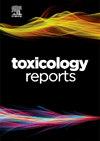代谢组学整合基因组学方法:了解暴露于阿霉素和ABCA1/EGFR/PI3k/PTEN串扰的MCF-7乳腺癌细胞的多药耐药表型
Q1 Environmental Science
引用次数: 0
摘要
癌症细胞,特别是乳腺癌,对治疗药物的耐药性是阻碍治疗阶段的主要临床障碍。对治疗药物产生耐药性的癌细胞可以重新编程自身的代谢过程,以克服治疗的有效性并继续其繁殖过程。尽管最近在耐药领域的医学研究取得了一些进展,对这一现象作出了一些解释,但真正的解释,以及准确预测其在乳腺癌细胞中发生的可能性的能力,仍然需要深入考虑肿瘤对治疗的反应动力学。为此,目前的研究结合了体外代谢组学和体内基因组学作为最先进的组学技术,可以为发明新的策略提供潜在的途径,以执行乳腺癌耐药现象的前瞻性,预后和诊断性生物标志物。阿霉素是目前可用的乳腺癌化疗药物;经证实,它可引起耐药,通过促进细胞增殖、细胞周期进展和阻止细胞凋亡,影响患者的生存和预后,信号通路之间的相互作用引发耐药。本研究采用GC-MS联合多变量分析对MCF-7和DOX耐药细胞系进行体外代谢组学分析;MCF-7/adr培养的细胞,此外,通过两种剂量的7,12-二甲基苯(a)蒽(DMBA)(50 mg/kg和25 mg/kg)诱导大鼠乳腺癌,再加上阿霉素(5 mg/kg)治疗一个月,进一步在体内证实。体外代谢组学结果表明,甘露醇、肌醇、甘氨酸、α-亚麻酸、油酸和硬脂酸的AUC值分别为0.14、0.5、0.7、0.1、0.02、-0.02(1,1)。甘氨酸和肌醇代谢物在野生型和抗性MCF-7表型中提供了最好的区分能力。同时,体内实验结果显示,DMBA给药后,氧化应激生物标志物和精氨酸酶II肿瘤生物标志物的变化与ABCA1和P53基因表达的分子评估之间存在显著的串扰,且耐药和凋亡生物标志物EGFR/PI3k/AKT/PTEN信号通路明显升高。数据显示,与阿霉素耐药相关的信号通路显著改变,影响乳腺癌的脂质代谢。综上所述,代谢组学整合基因组学分析有望通过调节ABCA1/EGFR/P53/PI3k/PTEN信号通路,了解阿霉素暴露于MCF-7乳腺癌细胞的多药耐药表型,因此代谢生物标志物和分子生物标志物阐明了乳腺癌有效治疗面临的挑战,并为代谢组学改善乳腺癌耐药识别提供了开创性的方法。本文章由计算机程序翻译,如有差异,请以英文原文为准。
Metabolomics integrated genomics approach: Understanding multidrug resistance phenotype in MCF-7 breast cancer cells exposed to doxorubicin and ABCA1/EGFR/PI3k/PTEN crosstalk
Resistance of cancer cells, especially breast cancer, to therapeutic medicines represents a major clinical obstacle that impedes the stages of treatment. Carcinoma cells that acquire resistance to therapeutic drugs can reprogram their own metabolic processes as a way to overcome the effectiveness of treatment and continue their reproduction processes. Despite the recent developments in medical research in the field of drug resistance, which showed some explanations for this phenomenon, the real explanation, along with the ability to precisely predict the possibility of its occurrence in breast cancer cells, still necessitates a deep consideration of the dynamics of the tumor's response to treatment. For this purpose the current study, combined both in vitro metabolomics and in vivo genomics analysis as the most advanced omics technologies that can provide a potential en route for inventing novel strategies to perform prospective, prognostic and diagnostic biomarkers for drug resistance phenomena in mammary cancer. Doxorubicin is the currently available breast cancer chemotherapeutic medication nevertheless; it was demonstrated to cause drug resistance, which impairs patient survival and prognosis by prompting proliferation, cell cycle progression, and preventing apoptosis, interactions between signaling pathways triggered drug resistance. In this research, in vitro metabolomics analysis based on GC-MS coupled with multivariable analysis was performed on MCF-7 and DOX resistant cell lines; MCF-7/adr cultured cells in addition to, further in vivo confirmation via inducing mammary cancer in rats via two doses of 7,12-dimethylbenz(a) anthracene (DMBA) (50 mg/kg and 25 mg/kg) proceeded by doxorubicin (5 mg/kg) treatment for one month. The metabolomics in vitro results pointed out that mannitol, myoinositol, glycine, α-linolenic acid, oleic acid and stearic acid have AUC values: 0.14, 0.5, 0.7, 0.1, 0.02, −0.02 (1, 1) respectively. Glycine and myoinositol metabolites provided the best discriminative power in the wild and resistance MCF-7 phenotypes. Meanwhile, in vivo results revealed a significant crosstalk between the alternation in oxidative stress biomarkers as well as Arginase II tumor biomarker and the molecular assessment of ABCA1 and P53 gene expression that displayed a marked reduction in addition to, the obvious elevation in resistance and apoptotic biomarkers EGFR/PI3k/AKT/PTEN signaling pathway upon DMBA administration. Data revealed a significant alternation in signaling pathways related to resistance upon doxorubicin administration that affect lipid metabolism in breast cancer. In conclusion, Metabolomics integrated genomics analysis may be promising in understanding multidrug resistance phenotype in MCF-7 breast cancer cells exposed to doxorubicin through modulating ABCA1/EGFR/P53/PI3k/PTEN signaling pathway thus metabolic biomarkers in addition to molecular biomarkers elucidate the challenges fronting profitable therapy of mammary cancer and an pioneering approaches that metabolomics compromises to improve recognizing drug resistance in breast carcinoma.
求助全文
通过发布文献求助,成功后即可免费获取论文全文。
去求助
来源期刊

Toxicology Reports
Environmental Science-Health, Toxicology and Mutagenesis
CiteScore
7.60
自引率
0.00%
发文量
228
审稿时长
11 weeks
 求助内容:
求助内容: 应助结果提醒方式:
应助结果提醒方式:


